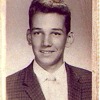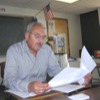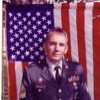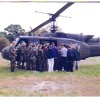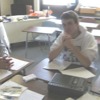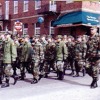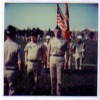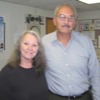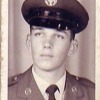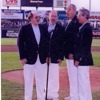

If you see this message, that means that you either do not have the latest version of Adobe Flashplayer installed (install it here) or you have blocked the ActiveX control for Internet Explorer. Please reload the page and allow the control.
 |
 |
|
| Mr. Bernard: 1960's | Mr. Bernard: 2006 | |
| Mr. Bernard describes a failed VC plot at an airport. | Mr. Bernard on vets' return to a skeptical country. |
Mr. Robert Bernard was born in 1946 in Waltham, Mass. He grew up in Brighton and later moved to Wayland, graduating from Wayland High School in 1964. He enlisted in the Air Force in January, 1965 and served for 27 years. During his last thirteen years Mr. Bernard was as a recruiter. He lived in Germany for three years, Thailand for a year, and in Korea for some time as well.
Mr. Bernard represents the ideals of the early 1960's, beliefs that he still holds close to his heart. His father served in WWII and he never wavered when duty called his name. He was a middle class citizen who was not all that interested in school, yet always had great pride in the United States. He decided that fighting for his country was something he wanted to do. Like most of our interviewees, Mr. Bernard believes that when the U.S. got into the war it was the right decision. He argues that it's easy to second guess the country’s decisions in hindsight, but that we made the best decisions that we could have made with the information that we had.
Mr. Bernard: I was not in direct combat in the Vietnam War, but I was in Thailand, in the air force. The planes that I serviced went over Hanoi everyday. The difference for me is that I spent almost 27 years in the military.
Q: So you made a career out of it?
Mr. Bernard: I made a career out of it. The thing is that there are no old people in the military, so I retired fifteen years ago. I brought a few things to show you, but I have very few pictures, my graduation picture from Wayland high School and my picture from basic training. I don’t know if you can tell, but I can tell from the look I had in that picture that I was only wishing , please let me go home, and if I survive another day, mother I’ll write you another letter. I did some black and white photography in Korea in the 1976; I spent a year over there. My air force time was from January 1965 to the middle of 1973, then the air force reserves for two years, then I came back in the army in 1975, and I retired in 1991. Air force time, there are two occupations there. I went in as a heating specialist and I went to a navy base in Fort Wayne California. I went to school there, went to Pope Air Force Base in North Carolina, and then I went to Germany for three years. So part of Vietnam I was in Germany and that was a great place to be. I finished that up and came back and retook all my tests, I was going to University of Maryland in Germany and I came back and retrained myself and I went into electronics. I was looking through the book and I didn’t know anything, but electronic countermeasures repairmen sounded good, so I went to school for that for a year in Cohaxi, Mississippi. I finished up that enlistment in 1973, went back into the army and ended up in Korea in 1976. I also was up in fort Devens in Massachusetts. This was a picture of me in 1973. I’m going to answer all your questions, but I just wanted to start with a little information about myself. When I retired I ended up in Florida, but I got a call from some people up here in Massachusetts looking for someone to teach junior ROTC at Rogers’s high school in Newport Rhode Island. This is a picture of me a couple of years ago. My youngest son was commissioned as a second lieutenant out in Utah and I was out there to pin on his bars. This is a picture of me when I came into the army, they didn’t care that I was a professional plumber, or that I was an electronic technician, or a heating and high-pressure boiler plant specialist, that didn’t matter. What they were interested in was how I was going to serve. They said you’re going to be a cook, or you can’t come in. Well I didn’t want to be a cook, it was the last thing in the world I wanted to be. But I ended up a cook, this was a picture of me with the colonel up at fort Devens and I ended up being the cook of the year in 1976. I’ll mention that here to, the military is good about a lot of things. One of them is that they commend you when you do a good job. Most people work really hard in the military. I had times that 20-hour days were not uncommon and we never complained because there is no such thing as overtime in the military. It depended on what your job was and where you were working. But I had hundreds of letters of recommendations and I got promotions and I wore stripes, and you get ribbons, and your accomplishments are recognized, just as civilian life does the same thing. My father had his World War Two bronze medal issued to him a couple of years ago, here’s a picture of that. This was a picture of junior ROTC, and we went to the National Guard place and the kids only because they were junior ROTC I was able to get them on that helicopter and went for a ride over Newburyport. I’ll answer your questions now.Q: So you grew up in Wayland, can you tell us what Wayland was like at that time?
Mr. Bernard: Well, I moved to Wayland when I was twelve, and lived here until I was eighteen. It was quiet and peaceful here, a nice place. We went to the Trinitarian church up in the center of town. The school was unique; nobody had a funny looking gym like that. We were a famous school. It was a pretty normal school; I enjoyed fun and games and had good friends.
Q: Did you play any sports in high school?
Mr. Bernard: No, I didn’t play any sports in high school, I was actually a member of the chorus, not a big male popular thing, but there were a lot of girls there.
Q: Did you join the army right out of high school?
Mr. Bernard: I had been out for less than six months, I’ll tell you the story, and we won’t tell my father. I was living at home, supporting a car, working part time at honey farms. I came home late one night and my father said, “You’re coming in too late at night, the rules of the house are you have to be home by midnight or im locking the doors.” Well I came home that night after midnight and the door was locked so I slept in my car. I taught my father a lesson, I wasn’t going to put up with that so I went down and enlisted in the air force the next day. Left within a few weeks. Twenty five years later my father came up to me and said, I’m really sorry for that time I locked you out of the house, I’ve never forgiven myself.” I told him it was the greatest thing he ever did for me, because I had no direction. I knew I didn’t care about school, I squeaked through with getting my graduation from Wayland High School, I didn’t know what I wanted to do. The military for me was a place to grow up. I’ll guarantee you, if you make it through basic training you’re going to grow up a little bit, and it worked for me. So that’s where the initial thought came from for me, my big bother had a friend who had joined the air force too, which was why I thought about it. But when they said that I was going to be a heating specialist, I said heaters on airplanes, I’m going in the air force.Q: So your father fought in World War Two, did he have any influence on you going into the military?
Mr. Bernard: I was always proud of my father, that’s funny, I’ve always loved my country, and going into the military was not surprising for me. The shock of basic training, for someone that slept till two every afternoon, because you’re up early and not getting much sleep and busy day and night. You survive that but you learn so much from it, but that doesn’t last forever, basic training comes and goes in six or eight weeks. When that’s over you go to school and you’re going some place and you’re doing the job and gaining the experience that goes along with the job. Now, I should warn you the last thirteen years I was in the military I volunteered to become an army recruiter that is the most difficult job in the military. I’ll give drill sergeants a break; they have a tough job too. They’re up at two or three every morning and they look perfect everyday and they work seven days a week a lot. But recruiting is different, because everywhere else in the military you accomplish your mission. But when someone says you need to put five people in the army this month, and you do everything you can day and night and you don’t fill the mission you’re a failure. Sometimes the civilian communities don’t cooperate when you are trying to accomplish your mission. I worked in Boston, I had several different positions there, but I was the noncommissioned officer in charge of operations. I remember looking at the Wayland statistics, and it was not really a good place for a recruiter to go.
Q: As a teenager, were you aware of a lot of world events, and the stuff that was going on around the world?
Mr. Bernard: Not much, really not much, what I learned about it at school and what I talked about, but I was not very aware of that as a young person, it wasn’t very important to me. I wasn’t someone who would listen to the 6:30 news. That comes with age. I didn’t care about it then and as I’ve gotten older and older that has become more important to me, to know what is going on around the world.
Q: What year did you join the Air Force?
Mr. Bernard: In January of 1965, I graduated in June 1964.
Q: When you joined were you aware of the growing conflict in Vietnam?
Mr. Bernard: Well in 1964 it wasn’t a big issue, it was just starting, we had advisors over there, but there were no large forces. It’s something I only know years later with the data. It didn’t really affect me, just like how Iraq doesn’t affect you today unless somebody you know gets killed or injured and that probably won’t happen, you being from Wayland.
Q: When did you leave Thailand?
Mr. Bernard: Thailand was 1972, now the war was over in 1975, or officially we were out of there in 1973, in fact I realize now my going over there was part of the final big bombing of the north. We had massive powers, we did. One thing I could mention is that no one fights a war that says you can only fight up to this line and you can’t cross it. You can’t go after the enemy you can’t cross that border. If they come over here and blow you up and run back, they’re safe on the other side. That’s the way it was, and nobody can fight a war that way, and that was one of the restrictions. Our hands were tied. The military wasn’t able to win the war; we weren’t allowed to win the war. We could send planes over and bomb strategic targets, so that was a real challenge, how we were fighting the war.
Q: Knowing that a war was going on, what was it like to leave for Thailand?
Mr. Bernard: I had two babies at home and a wife that was seven months pregnant. It was very difficult to leave, because the child was born by cesarean while I was gone. If you ever here of something called MARS it was the radio system joining antennas, that was how I got the one phone call the entire time I was over there, through this system. The mother and child were fine, but that was very difficult to leave. I was in homestead air force base in Florida, and I had been working part time at night. Selling cookware to make some extra money, I had moved up a couple of management levels, had done very well, in fact my wife and I were on our way to the Bahamas for an all expense paid for weekend. At two o’clock Saturday morning. There was an alert at the base, the first one I had ever heard. Eight hours later I was on the plane with my bag and I was gone. That’s hard, everything is left behind. My mother-in-law came down got my wife and the two babies and flew them back to Massachusetts. That’s difficult, but you also have a duty to perform. Somebody has to do this, believe it or not, and it can’t always be someone else’s son. That’s tough on mothers; no mother wants their son to go to war.
Q: How much news about the cold war did you hear and did it affect you much or at all?
Mr. Bernard: I knew enough about the cold war, we were going to win, and we were going to beat those Russians, there was never any question about that. We were the most powerful nation in the world. I was worried about the domino theory and that was a real threat. You can ask the question was the Vietnam War right or wrong. Well, when it started it was right, it was public opinion over years and years of sacrifice and loss, 58,000 people. You want to know if it was right or wrong, we did it because our intelligence told us it was the right thing to do. Gee, is there a connection with Iraq here, maybe. But even as a young person I thought, we had to beat the Russians and we couldn’t let communism take over the world. We had to stop them, where do you stop them? It’s easy to look back on history and say you should have gone to this country and not this one, and ten years from now maybe we’ll say we should have gone to Iran instead of Iraq, but we don’t know that right now. It’s easy when you’re looking back. Hindsight is much easier. Tough decisions, we hope that we have the greatest political leaders in the world to guide us and that their cabinet members should be the best and brightest people in the world.
Q: You talked about how hard it was to leave your family, did you have any friends that were enlisting or that you met on along the way?
Mr. Bernard: You know, you make thousands of friends over those twenty seven years and I’m only in contact with a few of those people, they come and go. I knew one person that died in Vietnam just a hand full of others. The only person I still know from Wayland is my brother who still lives here. I’ve tried to track down some people over the years, but I have no relationships with anybody in Wayland anymore.
Q: How many times do you think you have moved in your life?
Mr. Bernard: You know I had it written down once, I would say about thirty five times in twenty seven years. I’ll probably slow down now that I’m getting over but those were all adventures, I’ve always had a positive, optimistic attitude, I really have. There are things that can be sad and depressing time to time, but overall I am an optimist. If I want to talk about this country I’m an optimist about this country, but I worry about no prayer in school and there a lot of issues like that that I worry about.
Q: How would you describe your interactions with the foreign people that you met and saw while you were serving?
Mr. Bernard: Well, we had some incidents in Thailand. I know there was a busload of North Vietnamese dressed up as German tourists, and they infiltrated the runway and they were running towards the plane as they were killed before they could take off. The people were wonderful for the most part; I’m going to jump back and forth between my time in Thailand and my time in Korea. I loved the oriental people, they have great standards in life, they are relatively happy and they can live on nothing. We had a guy who would shine our shoes, for about twenty of us, and that was only one thing he did every day. He did all your laundry, he cleaned all of your rooms, and he took care of everything. He made five dollars a month from each of us, and that was an incredibly good job; he was thrilled to have that job. The way I perceived the situation was that these were wonderful people, but they have absolutely nothing. In Korea, the average person worked for two dollars a day in 1976. They lived on rice and vegetables, their lives were different and I appreciated them. I admired them; especially the Koreans. They were so glad that we were there. They knew that if we weren’t there that they would be attacked by the north. Its funny how what I see and hear on the news is so distorted from the image I had as a soldier on the ground. We had a helicopter that strayed just over the border into the DMZ. It was shot down. The North Koreans shot three out of four of them and kept one for a prisoner just to exchange. We were on the DMZ, I was with an artillery battery and we had our six guns aimed north loaded, cocked and ready to pull the lanyard, and they were all aimed with computers that told the shot where to go. And we did everything but pull the lever. That’s as close as you get, tension, stress, pressure. And there were no real facilities out there in the DMZ, we lived out in the woods and we did what we had to do.
Q: Can you walk us through a typical day when you were in Thailand?Mr. Bernard: Lets pick, yes Thailand, because that was a wartime situation although we were not being shelled. We worked. I was in the Air Force, which is a lot different than the Army and Vietnam I’ll be honest with you. We worked simply 12 hours on 12 hours off, 7 days a week. And what would you do with your time off? You’d wash your clothes. And do other stuff that you had to do. Only a few times did I actually go far from where I was. We had everything we needed right there, they had a movie theater and rec. halls, there were a number of things we could do, but there wasn’t a lot of free time. Often we’d get behind and we would have to go in and work extra time. Oh I have to tell you one thing. Electric Counter-Measures don’t work good when it’s hot out. Anyone in Vietnam will tell you this, as soon as they opened the doors of the plane you got hit with a wall of hot humid air and it stunk bad. And you never forget this, but after a minute of being in Southeast Asia you were drenched with sweat. I say this because the EMC were kept in an air-conditioned room, I think we kept it at 80, which was unbelievable, and the humidity was kept really low. So it was kind of fun to go to work. Our barracks were screened open all the sides with just screens, and if you’ve heard of monsoons, it was thunder when it hit that roof, and the water poured down the sides, you couldn’t even see outside. And that happened pretty often.
Q: The civil rights movement was going on at the time, did you work with a lot of black men?
Mr. Bernard: Yeah we had a pretty good mix over there. And I have no problems with black men, but you could identify a few white racists and a few black racists and they kept to themselves. But there was a phase when we would go to the Movie Theater and the blacks would come in and they would have this welcoming ceremony of how many hand taps they could get. It would take 30 seconds to a minute for two guys to say hello. And I thought it was humorous and almost entertaining, but it was kind of in a sense of the blacks over there and the whites over here, but we worked together. Another misconception was that everyone in Vietnam was on drugs. Well nobody was, I never saw drugs in 27 years, I’m sorry I had to report someone on guard duty, he had one marijuana joint in his wallet. That’s the only drug experience. In fact I don’t think I drank any alcohol while I was over there, except for when I was in Germany. It wasn’t an issue where I was. I don’t know if the stats are correct, but in 1979 when I became a recruiter, the army changed from accepting a lot of non high school graduates. This didn’t mean they weren’t good soldiers, but it had an impact on higher-level training, when you have an A-1 tank, you want smart people running that tank. It wasn't a big issue though where I was.
Q: How do you feel about People like [John] Kerry who became against the war after they left?
Mr. Bernard: Mr. Kerry was in the war; he was there, but only for a few months. And he was there. I’m not going to judge anybody because I wasn’t there, I was in Thailand. But I’ll say that I hope that Americans always research and vote for the best choice for president that way we have the best the brightest, the smartest, and the most patriotic person in office. It used to be way back when, that 97% of the congress had come from a military background, it was almost a requirement. And that has changed, its not as important any more. But that, how do you sever your nation, and you don’t need to go into the military and I mean that, there’s not enough room for everyone, we only need 89,000 a year, that’s a couple thousand out of millions. And most people need to go to school and I know that, and you’ve got ROTC in college.
Q: What did you think about Kent State and what happened there?
Mr. Bernard: Very clearly to me was the fact that there was no reason that the soldiers fired. Protestors have the right to Protest. I don’t know what the rules were. If you’re only supposed to protest here, from this time to this time, why they’re running all over the campus, I don’t know, but whatever it’s inexcusable that the military fired on civilians. That’s my opinion and again I wasn’t there, but I can’t see why, to think that they heard a shot; it could have been a firecracker or really anything, and still no reason for a student to be shot.
Q: When the other soldiers found out about the event did they react differently?
Mr. Bernard: I don’t think so, I don’t remember anyone saying, ‘oh why didn’t the shoot all of them’. When it was discussed I think that most people had my opinion, again you have the right to protest that’s what’s great about our country. Now there are rules for protests, that’s all, and I know there were rules there, but I don’t know anyone that felt those kids should be shot. There may be other people, but I never met them.
Q: Some Vietnam Vets were disrespected by the public in general for serving in Vietnam; did you think that there was a public betrayal of the soldiers?
Mr. Bernard: You know there are probably hundreds of thousands of vets out there today around my age who are alcoholics, drug addicts, and it’s part of that, and I’m not saying that this is the only reason, but for the ones that were in heavy combat, that will mess you up. Many of them couldn’t come back unscathed, even when there is a parade for them. But those kinds of things didn’t happen to me where I was; you see I never had a problem with that. But I’m quite aware of the groups that were outside, especially in California when they came back, and that was hard. So that just added to the, “why was I there, was it all wrong?” you know, yes I killed people, and lot of soldiers lives are being shattered over that because they aren’t getting the support that they need, why aren’t they all heroes. You know when they talk about Vietnam, and I’m going to say this again, “should we have gone in there?” How do you make that decision in 1963 and 1964, when they sent a few advisors over? And them how do we get out? Very literally we weren’t allowed to win the war, and that’s always a frustration. But was it right or wrong, there is no right or wrong, you did what the best resources in the country told the government, to protect. How do you say we were protecting America because we were at war 12,000 miles away? The Soldiers might protest these things, maybe retired generals do, and you think Rumsfeld should go?
Q: Do you think there are any lessons that America should have learned from being in places such as Vietnam and Korea?
Mr. Bernard: I think that and I’ll say this for bush too, I don’t believe that they made a decision one morning that we’re going to go to Iraq and wipe them guys out, don’t believe that, I think he did stop for months and months and months, and thought “I’m going to be sending our boys into harms way and many of them will be killed”, and I don’t think he sleeps well at night, but what do you do, how do you get out of there, this is the complicated thing. Did 9-11 really happen, were there really people who flew planes into buildings and are there people who want to do it again, is there any doubt in your mind that they want to kill anyone they can. And they just don’t care who they kill, they just don’t care, I’m against those people. I can’t be a pacifist against those people who want to ruin my way of life. Now when you take the ultimate scenario, a Marine finally does find one single bomb in a suitcase, but its been dropped on the shore near New York, and it kills all those people and destroys the city. What if they took out New York, or what about Washington D.C., I mean what does it take to destroy our country, and I don’t know, but don’t you agree that the presidents best advisors want to make us all safe? And they are all wondering how do we stop them, and they are committed to stopping all of the terrorists, who all they want to destroy is our way of life. I don’t lose sleep over it, because I am very confident that this country will do what’s right. But does that all go back to whether or not war is worth fighting? I don’t like war, I’m against it, and soldiers even hate war.
Q: Since the war have you gone to visit the Vietnam memorial?
Mr. Bernard: It’s a very sad, very melancholy place. I do have one friend whose name I go to visit. It’s really a mixture of my life, I served in the military for so long, but even still I don’t define myself as the ultimate patriot, but those whose names you see on the wall are the patriots. And How about the WW2 memorial, 400 stars representing the 400,000 deaths, those soldiers sacrificed.
Matt and Russ: Well, that’s all the questions we have for you today thank you very much for coming to talk with us, it’s been a true honor. Is there any thing else you would like to share with us before you leave?
Mr. Bernard: well I would like to say that the founding fathers of this country were inspired by God to create a democracy and to give the freedoms that were unheard of in the world at that time and it could only happen here. It took a revolution to do that, and we won, and we have a destiny as long as it remains as a worth while nation and lives up to its creed this is important. What is success in life for me? I’m happy for what I’ve done, I have two sons who have gone on church missions around the world, and they were both eagle scouts. My grandmother was DAR.
